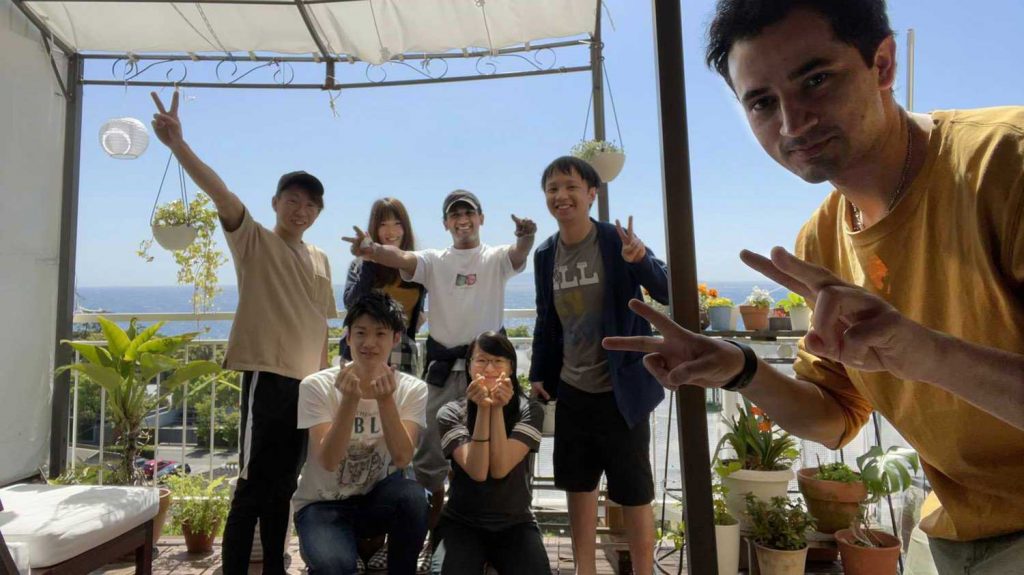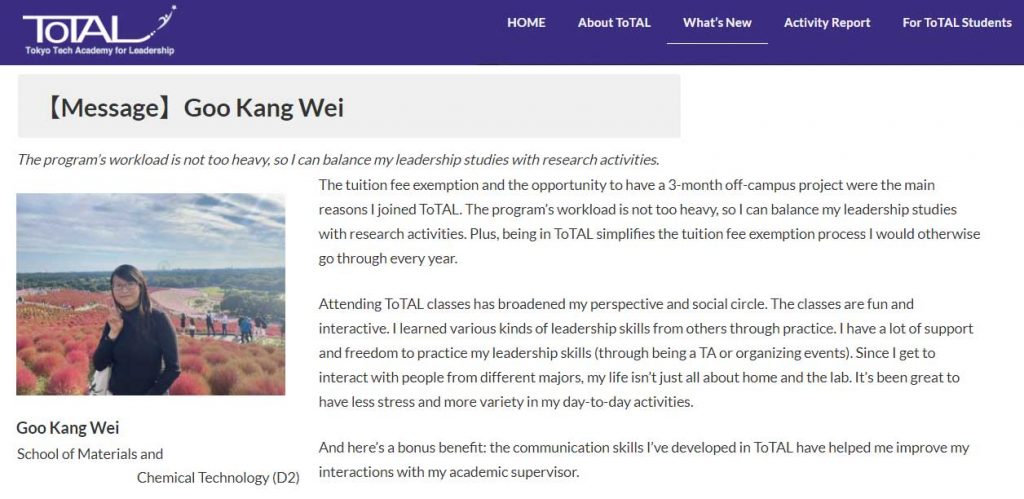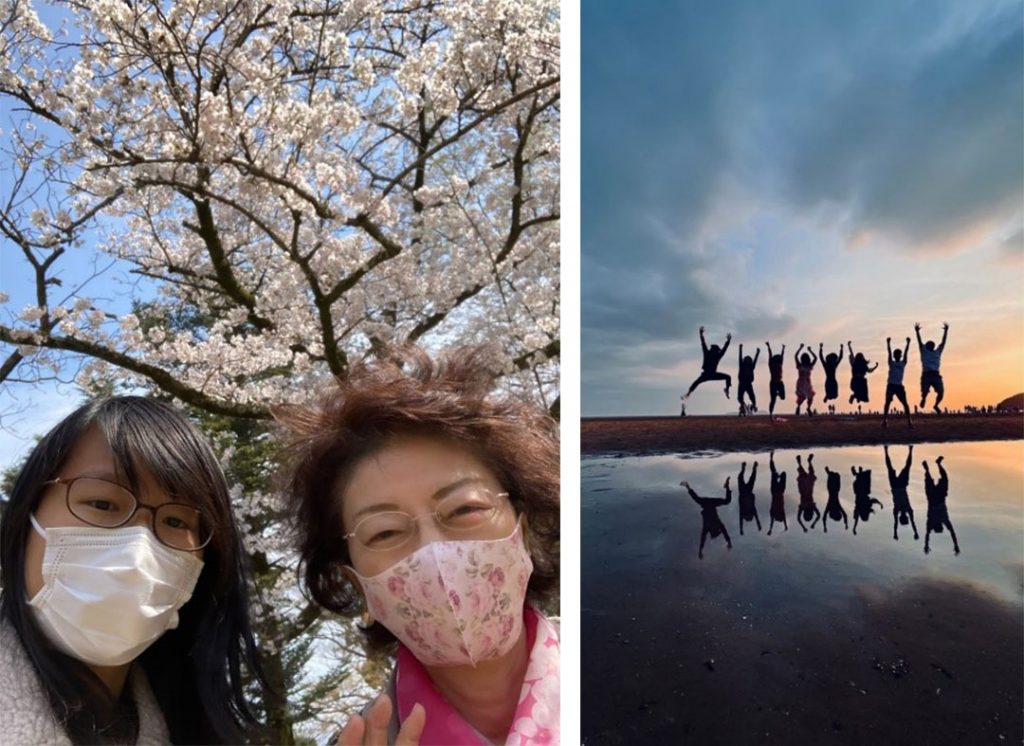I came to Tokyo Tech as a privately funded student, in other words, I did not have a scholarship when I started my study in Japan. I came to Japan alone, with no friends, no scholarship circle, and with beginner-level Japanese skills. When I first came to my lab, it was really hard to join the conversations since most of them spoke only Japanese. Furthermore, I had to learn to operate experimental equipment from senior students. I was struggling with the language barrier and cultural differences. Since I could not understand fully what was spoken to me, I often made mistakes and felt helpless and alone.
Luckily, as stated in my first blog, I stayed in a sharehouse that had both Japanese and foreigners. They were mostly working adults and most of the foreigners spoke fluent Japanese, thus they understood the difficulty of a beginner. I was lucky that all of my housemates did not shy away from speaking Japanese with me even with my beginner-level Japanese. We spoke multiple languages when conversing to ensure that everyone was not left out. Also, they would try to rephrase words if I could not understand them and would correct me when I made grammar mistakes. There was a television in the living room as well where I could learn new Japanese words by watching programs daily. This helped to improve my Japanese speaking skills greatly since colloquial Japanese was not commonly taught in class.
Moreover, I found friends with whom I share the same hobbies and travel together. Additionally, my sharehouse mates are from various backgrounds, which gave me exposure to their cultures. In addition, having such different perspectives made it all the more interesting when exchanging information on life in Japan. Below are some of the things that I learned through my sharehouse mates:
- The job-hunting process in Japan starts roughly 1 year before we graduate from university.
- The process to apply for tax and pension exemption as a student (Japanese students did not know about this because they don’t have to do this).
- What it’s like to work as a freelancer and a foreigner in Japan.
- The kind of jobs and visas we could get according to factors such as education level, type of first job, and many more.
- What it’s like to work at a “black” company, and how Japanese working culture is changing.
- The difference between Japan’s graduate program in the business field and science field.

Other than with the social circle in my sharehouse, I spend most of my time in the lab. Every lab is different, but in my lab, students spend most of their time there, either doing deskwork or experiments. Besides, there are not a lot of lectures for graduate students, hence the social circle is often limited to within the lab. At one point, I felt that my English was getting worse, my social circle was too small, and my mindset was getting narrower. I wanted a change in the environment where I could interact with people from other labs, preferably in both Japanese and English. That’s when I came across Tokyo Tech Academy of Leadership (ToTAL). ToTAL is a university program that focuses more on developing our soft skills, and it is open to all Tokyo Tech students without additional charges. ToTAL classes were mostly conducted in an interactive style where we could interact with students from different majors. Moreover, most of the ToTAL professors and staff members are fluent in both Japanese and English, hence classes are held in both languages as well. I was really impressed that ToTAL has a community where students have the chance to organize some parts of the classes. Some of the examples are, one of my seniors organized a 4-day 3-night mindfulness camp at a UNESCO World Heritage site, which I shared in my previous blog, while I organized a welcome party for new students, facilitated a book dialogue class, and brainstormed ways to improve the program. It is a great community where I could learn about the situation in other labs, expand my interdisciplinary interactions, and improve my soft skills.

During my holidays, I joined cultural activities organized by the Foreign Student Circle (FSC). FSC is a free-to-join community for foreign students. A mentor is assigned to each foreign student and we explore Japanese culture together, including kimono-wearing events, kabuki events, print shows (famous Japanese art style), and many more. Photo 3 is a picture of me and my mentor, Masami-san, in a Sakura viewing outing. Surprisingly, both Masami-san and I were born in the year of the rooster. I am also lucky that we have similar interests and could click right away. FSC has broadened my perspectives on Japanese culture and helped me understand the way they think and act as a society. Besides that, I made friends with people from different universities.
Furthermore, I would go out of my comfort zone once in a while to join my friend’s activities. I went on a 1-week road trip to Shikoku with 7 people, all of us were from Malaysia but half of the members were new to me. I joined anyway since I like to travel. They were very welcoming, and we had a fun time together. Photo 4 is a photo of us at Chichibugahama Beach. They taught me how to obtain a Japanese driver’s license as a Malaysian and what it’s like to live in different parts of Japan. I am glad that we keep in touch even after 2 years.

In conclusion, I highly recommend students to join activities or programs outside of their lab as well. There are a lot of opportunities in Tokyo Tech where information is shared through the university website and email news. Most importantly, try to go out of your comfort zone and interact with various communities, well, “never try never know” right? It is hard to build a social circle from scratch in a new environment, but you’ll grow a lot during the process. From my experience, I discovered a lot of new aspects of myself and learned to treat every new meeting with an open mind since we wouldn’t know when we’d connect again. I hope you can find some lifelong connections here in Japan as well.
